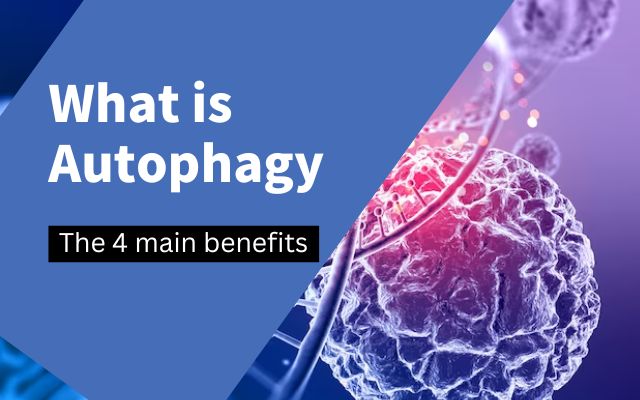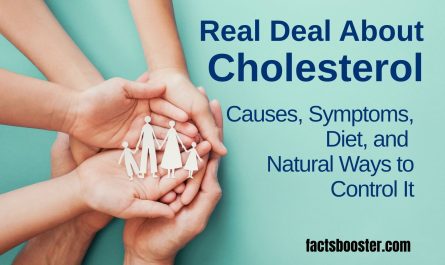In recent years, autophagy has been talked about by more and more people because it turns out to be an instinct of our body cells. As long as you know how to activate this mechanism, you can prevent cancer. Today, we will discuss the role of autophagy to allow the body to repair itself and restore our health.

What is autophagy?
Autophagy is the process by which the body reuses old and damaged cell parts. Cells are the basic building blocks of every tissue and organ in the body. Each cell has its own function, but as we age, these cells may become defective or stop functioning, becoming garbage or waste within healthy cells. (1)
Autophagy is the body’s cell recycling system, a process that allows old cells to be removed and usable debris to be reused into new, usable cell parts, and unwanted cell parts can be discarded.
Autophagy is also a process of cell quality control. Excessive waste occupies the space of cells, slowing down the operation of cells and preventing cells from working properly. Autophagy reshapes messy and disordered garbage into the normal cells we need, optimizing cell performance.
Why is autophagy needed?
Autophagy is a self-protection mechanism of cells that has multiple important functions. First, it can remove damaged or aged organelles within cells to keep cells healthy.
Secondly, it can remove toxic substances and garbage in cells and maintain the stability of the intracellular environment. In addition, autophagy can also provide nutrient supply inside the cell to support cell growth and survival when there is a lack of nutrients outside the cell.
Autophagy plays an important role in many physiological and pathological situations, such as maintaining cellular homeostasis, preventing aging, preventing infection and cancer, etc. Therefore, autophagy is a process necessary for cell health and survival.
In addition, autophagy can also affect cellular metabolism and signaling pathways by regulating the levels of intracellular proteins and organelles. By regulating these processes, autophagy can affect the physiological state of the entire organism, including energy metabolism, immune responses, and developmental processes.
In some diseases, the function of cells may be damaged, leading to problems such as accumulation of intracellular toxic substances, organelle damage, and metabolic abnormalities. These problems can lead to a range of illnesses, including neurological disease, cardiovascular disease, liver disease and cancer.
Therefore, autophagy is a necessary process to maintain the normal functions of cells and organisms, and its role and significance cannot be ignored. Through in-depth study of the mechanism and regulation of autophagy, new ideas and methods can be provided for the prevention and treatment of various diseases.
Why cells become abnormal or damaged
Cells are affected by a variety of internal and external factors, causing them to become abnormal or damaged. These factors include: (2)
- Genetic mutations: A cell’s genome may mutate, causing abnormal production of proteins or RNA within the cell.
- Environmental stress: Cells may be affected by environmental stress such as chemicals, radiation, infection, etc., leading to damage and incomplete repair of proteins, DNA, or RNA.
- Cell metabolism: There may be problems with the metabolic processes within cells, leading to the accumulation of garbage and waste products in the cells, causing damage to cell functions.
- Autoimmunity: Cells may be mistakenly recognized by the immune system as foreign invading substances and thus be attacked and damaged.
- Age: As age increases, the repair mechanism inside cells gradually fails, the metabolic level of cells decreases, and the function and viability of cells gradually weaken, making damage and aging prone, and even diseases such as cancer.
- Disease: Some diseases can also cause cells to become damaged or become abnormal. For example, tumor cells continue to divide and proliferate due to certain genetic mutations, leading to imbalances in the intracellular environment and abnormalities in cell death pathways. These factors can lead to cell death or abnormal proliferation of tumor cells.
These factors will cause changes in biological molecules such as proteins, DNA, and RNA inside cells, affecting the internal mechanisms and functions of cells, thus affecting the normal survival and functions of cells. If these changes cannot be cleaned up and repaired in time, they will lead to cell aging, damage and death.
Therefore, cells need a clearance and repair mechanism to remove garbage and waste, repair and renew damaged and aging components, so that cells can maintain a healthy state, maintain normal physiological functions, and prevent the occurrence and development of diseases.
Autophagy is such a mechanism that can maintain the health and stability of cells by degrading intracellular garbage and waste, repairing damaged components, and maintaining the stability and normal functions of the cell’s internal environment.
The benefits of autophagy
The benefits of autophagy can be explained from the following aspects: (3)
1. Extend lifespan
Autophagy helps remove waste and harmful substances within cells and maintains cell health and stability. Cells will age and degenerate with age. Autophagy can maintain the freshness and health of cells and extend the life of each cell.
2. Reduce inflammation
Autophagy can help reduce inflammation levels because it removes damaged cells and organelles that are a cause of inflammation.
3. Anti-cancer effect
Autophagy can eliminate potential carcinogens in cells, and can also enhance the immune system’s ability to clear cancer cells, thus having a certain anti-cancer effect. Some studies have pointed out that many cancer cells can be eliminated through autophagy.
4. Support heart health
Autophagy helps maintain the health and stability of heart cells, which is important for heart health. Strengthens heart health by eliminating cellular debris from oxidative stress and inflammation. Research shows that insufficient autophagy may be related to the occurrence of many cardiovascular diseases.
The principle of autophagy
When our body cells lack oxygen and nutrients, or are damaged under any circumstances, the autophagy mechanism begins. Autophagy is a complex biological process involving multiple steps.
Simply put, the principle of autophagy is to wrap damaged or aged organelles, proteins and other “waste” inside the cell into a double-membrane vesicle (autophagosome) through the action of a series of membrane structures and enzymes. , and transport them into lysosomes, where they are eventually broken down into small molecules and nutrients for cell reconstruction and reuse.
Cells eat themselves to survive, which brings many health benefits and causes cells to work more efficiently. (4)
How to perform autophagy
How do we make cells autophagy? It is to put pressure on these cells and make them enter a phagocytic state.
1. Intermittent fasting
Studies have shown that after 24 hours of fasting, cells begin to enter autophagy. After 48 hours of fasting, autophagy will reach its peak. (5)
2. Limit calorie intake
Reducing the total daily caloric intake by 10-40% will allow cell autophagy to function better. This will force the cells to autophagy to replenish nutritional deficiencies. (6)
3. Low carb and high fat
Consuming a low-carb and high-fat diet puts the body into a metabolic state and stimulates autophagy, as cells begin to burn fat to obtain more energy. (7)
4. Exercise
Many studies have pointed out that when skeletal muscles exercise, they will activate the autophagy mechanism. Through exercise, the ability of autophagy will be improved and the effect will be enhanced. (8)
Can autophagy prevent cancer?
Research points out that autophagy plays an important role in preventing cancer. Autophagy can eliminate damaged or abnormal proteins in cells and prevent the accumulation of these proteins from negatively affecting cells.
In addition, autophagy can also inhibit tumor formation by clearing potential cancer cells or preventing malignant transformation of cells. Some studies suggest that a lack of autophagy may contribute to the development of cancer, while increasing autophagy may reduce the development of cancer.
In the early stages of cancer, autophagy can inhibit malignant transformation. (9)
Autophagy and immune system
Autophagy is an intracellular garbage disposal mechanism that can degrade and recycle harmful proteins and organelles in cells. Autophagy plays an important role in the immune system.
First, autophagy can help cells remove waste produced by infected pathogens, thus promoting the normal function of immune cells. For example, when infected with bacteria or viruses, cells degrade through the autophagy pathway and display the antigenic peptides of the pathogen, thereby activating cells of the immune system, such as T cells and B cells, to attack the pathogen.
Next, autophagy can also regulate intracellular immune responses. For example, autophagy can degrade abnormal proteins in cells and secrete inducible type I interferon through autophagosomes, thereby regulating immune responses.
In addition, autophagy is also related to autoimmunity. Autoimmunity refers to the immune system attacking one’s own tissues and organs, leading to the occurrence of autoimmune diseases. Studies have pointed out that abnormal autophagy is related to a variety of autoimmune diseases, such as rheumatoid arthritis, systemic lupus erythematosus, etc.
Therefore, autophagy plays an important role in the immune system, helping to remove waste and regulate immune responses, thereby maintaining the health of the body’s immune system.
What is autophagy? Summary
What is autophagy? The functions of autophagy include removing cellular waste, maintaining the stability of the intracellular environment, regulating cell growth and differentiation, and helping to clear infectious pathogens and regulate immune responses in the immune system. Autophagy is an important cell life mechanism and plays a key role in maintaining human health. Most importantly, it is a free mechanism of the body that can be activated as long as we make adjustments in our lives.


